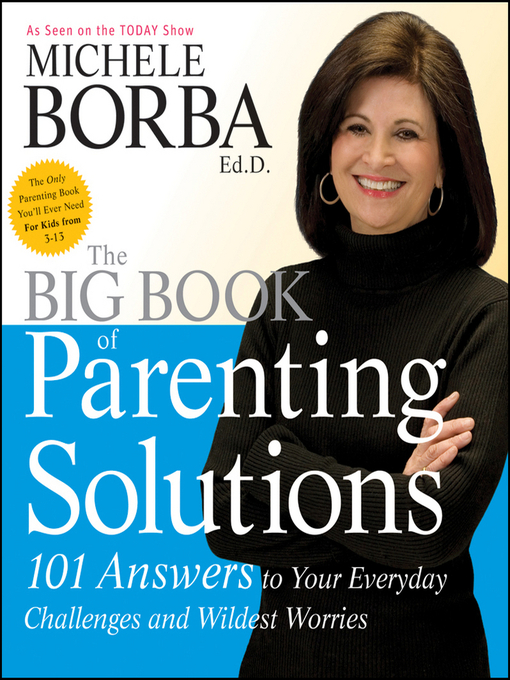Parenting strategies to help kids solve their problems, be self-reliant, bounce back from failure and not use us as their managers, arbiters and palm pilots

A mom was running late as she drove her two sons to school. “Can we pleeeease go back?” her six-year-old pleaded. “I forgot my stamps for show-and-tell.”
Any other day, this mom would have made a quick U-turn to retrieve the forgotten item. She’d done just that—more than a few times. But something clicked in her head:
“If I’m always rescuing my kids, they’ll just take it for granted that I’ll do it for the rest of their lives.”
So this time her response was different.
“I know you’re upset,” she said, “but we’re not going back. I’m sure we can figure out something else for you to share. Let’s brainstorm some ideas.”
Her son was not thrilled, but by the time they got to school, he did have a plan—and this mother experienced an “aha” moment that would help her children learn to be more resourceful and less dependent on her.
Take a Reality Self-Check
How would you have responded? You might want to take a Reality Check and identify your current parenting style with your kids. I dare ya!
Think about how you usually act when your child seems frustrated, seeks help, fails or isn’t doing a task up to your standards. Here are a few possibilities:
The Parenting Style Quiz
Protector: “If you need anything, I’ll be sitting right here during the party.”
Rescuer: “I’ll figure it out for you, honey.”
Over-involved: “I’m calling that kid’s parent and telling her to invite you.”
Enabler: “You’re tired, sweetie. Go to sleep and I’ll finish this for you.”
Perfectionist: “I’m remaking your bed; you didn’t tuck the corners in just right.”
Or something else?
The truth is, if you want to raise an independent kid who can someday thrive (and survive) without you–and oh how I hope you do!–you need to show some restraint in the “lend-a-hand” department. Data shows that the 21st century parenting style is a lot of protecting, rescuing, helicoptering, over-involving, micromanaging, and enabling and it’s not doing our kids any favors.
If you feel just a tad bit guilty, then make a list of reasons why you should break these habits. Or write yourself a letter and describe how it hiders your child’s independence. Reading it everyday will help keep you motivated. Then take a pledge to stop your habit, and go for it! Breaking old habits is hard work, but it’s doable.
Here are tips to help you move from “Doer” to “Guider.” (Believe me, your child will thank you someday!)
Strategies to Build Self-Reliance

1. Learn to Guide, Not Do
No parents want their children to suffer heartaches and disappointments. Our basic instinct is to try and protect our kids from frustrations and solve their problems for them. But doing so prevents them from developing the very skills they’ll need to deal with the multitude of issues they’ll face in the real world.
If you really want your child to become self-sufficient and thrive without you, your role must be of a guider, and not doer.
That simple twist from doer to guides teaches your children that you expect them to be resourceful by solving their own problems-whatever they may be and that you believe they are capable of doing so.
2. Back Off From What Kids Can Do Solo

It may be time for your child to fix his own launch, make her bed, do some laundry or call for a dentist’s appointment. It depends on your child’s age, maturation, and current capabilities, of course. The goal is to not overwhelm children with new expectations. Gradually introduce only one new task at a time. Here are three the steps to teaching kids any new skill:
Teach, Guide, Step Back
1. Teach your child how to do the task.
2. Then step to the side and guide your child (watching to ensure that your son or daughter can do the task.
3. Finally, step back when your child has mastered the skill. It’s now time to teach another life skill or task.
Think: What is the one new task I can teach my child today using these three steps that will help him on the road to independence?
3. Stop Rescuing
You may have found yourself rescuing your kids a lot lately. And oh the excuses we use: “Kyle’s too busy. I’ll do her chores tonight.”
One way to change this pattern is to start with a family meeting where you agree together on a new policy about taking responsibility—whether it’s for doing chores or finishing homework—and how any lapses will be handled. That will also help teach children that their actions have consequences.
Your new parenting mantra: “Never do for your child what your child can do for himself.”

Use picture reminders for young kids
4. Teach Organization Skills
Is your child misplacing library books? Unable to find sports gear? Losing teacher notes? Instead of bailing your child out, ask: “What can you do to solve this problem?”
For instance, kids might hang up a special calendar on which they mark library due dates, music lessons, field trips and tests. Even a young children can draw “picture reminders.”
Learning to organize is an important skill all children need for managing their own lives-so they rely less and less on you as time goes by.
5. Teach Brainstorming
Want your child to be able to solve problems someday without you? Then you must teach the skills of brainstorming. The first step is to identify the problem and express confidence that your child can work it out. You might need to help kids at first understand that brainstorming means coming up with lots of different ideas, no matter how silly those ideas may sound.
The next step is to identify the best ideas and figure out a plan for how to try them. With practice, children can use brainstorming to solve many issues that arise—without your help.
6. Teach How to Negotiate

Teach tie-breakers like “rock-paper-scissors”
Do your kids expect you to always be the arbiter who will end their battles? Try a new tactic: Teach your kids how to neogitate. Explain that the purpose of negotiation is to work things out so all sides are satisfied. Then establish clear negotiation behavior.
Take turns listening to each other without interrupting. No put-downs. Only calm voices are allowed.
Then practice using this skill as a family. Another negotiation skill kids can do by themselves is to use tie-breakers such as “rock, paper, scissors,” drawing straws or following the rule that “Whoever went first last time goes last this time.” Kitchen timers can also reduce squabbles over sharing.
7. Talk About the Future
Encourage children to think beyond the here and now, as appropriate for their age. For example, with a young child you might take about the next day or with an older child, the coming summer. This is particularly important because, as author Mel Levine has written in A Mind at a Time, we are experiencing an epidemic of “career unreadiness.” Levine believes there are four major qualities common in young people who make success life transitions:
- They are self-aware,
- They are keen observers of the outside world,
- They possess certain “tools” (the ability to master skills, develop work efficiency, and think productively), and
- They are strong communicators.
Final Thoughts (from who could be better) Confucius
My favorite parenting quote is from Confucius:
“The most beautiful sight in the world is a child going confidently down the road of life after you have shown the way.”
Tape it to your mirror so you don’t forget your real goal in parenting!
Dr. Michele Borba, Parenting Expert

I am an educational psychologist, parenting expert, TODAY show contributor and author of 22 books.
You can also refer to my daily blog, Dr. Borba’s Reality Check for ongoing parenting solutions and late-breaking news about child development.
Follow me on twitter @MicheleBorba
Portions of this post are from my latest book, The Big Book of Parenting Solutions. For more tips about helping stressed kids refer to specific chapters: Disorganized, Short Attention Span, Problem Solving.

